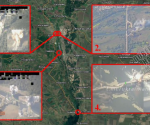Reports: Islamic State’s days are numbered – warmongering US/UK governments still use it as bogeyman
Various reports collectively suggesting the imminent overall defeat of Islamic State (otherwise known as ISIS) and other “Takfiri” mercenaries by Syrian, Iraqi and Kurdish forces, are appearing out of the Middle East at the same time as President Obama has announced a plan to escalate US military engagement against ISIS in any theatre of war in which they operate – potentially, therefore, to realise a long held geopolitical ambition of the US Government to deploy ground troops to Syria. The apparent contradiction should not be confusing to those understanding the genesis of ISIS out of the NATO invasion-by-proxy of Libya – a conspiracy fact that, despite the monopoly of corporate-media, is being helped into the pages of history books by the likes of US Senator Rand Paul who recently made comments linking ISIS with the Obama/Clinton regime’s “kinetic action” which culminated in the overthrow of Gaddafi. The White House’s new warmongering is completely understandable in the context of a scenario where ISIS is merely a huge, but nevertheless deadly, psychological operation with an objective to deliver a pretext for heavy US intervention in the Iraqi/Syrian war zone, but which is fast running out of lifetime to do it in. If it seems unlikely, then comparisons can be drawn with Ukraine to witness a pattern of pawn-sacrifice to create a situation on the great chess board from which the US and its coalition partners can clean up. In the Ukrainian example, the panicked dash by the German Chancellor and French President to Moscow came as the US was threatening to send heavy armaments to the Ukrainian regime’s failing forces – not only to save them from a crushing defeat, but also to employ in a wicked strategy targeted against civilians to force Vladimir Putin into doing that thing he’s only been accused of doing thus far – invading Ukraine. This would have given the US/UK and NATO a rationale for demanding further economic penalisation and, international isolation of, or even going to war with a Russia that is nevertheless building new economic networks and extending the BRICS alternative to US/UK global hegemony. As in Ukraine, so in Syria and Iraq, where ISIS, against all normal expectations, are still going out of their way to provoke the US into intervening against them – on the face of it, at least – and in reality to bring the US into play against the real enemy – President Assad’s Syria.
The news coming from Syria is that ISIS, or a good element of it, have retreated to their stronghold of Raqqa, and the Syrian Arab Army is in the process of moving up to dislodge the terrorists from their positions. There are other successes for the Syrians: at Aleppo the terrorist mercenaries, predominantly going under the name of al-Qaeda affiliated al-Nusra (now seemingly happy to be working in concert with ISIS rather than in competition as has always been claimed by corporate-media), have been encircled and cut off from resupply from Turkey. There is news from the Golan Heights that “rebels” are looking to be saved by Israeli air strikes. This is perhaps not so unbelievable as it appears. There is history of wounded combatants of the mercenary forces ranged against the Syrian Government being treated in Israeli hospitals. Israel has also made bombing forays into Syria in what Syrian officials have interpreted as “direct aggression carried out to help the Syrian government’s opponents”.
In contrast to these under-reported developments, the plight of Kobane has been well documented in corporate-media, and is now apparently free of an ISIS threat. The turn of the tide in that fight was the joining of the Turkish PKK to it, although US air power is often mentioned in the same sentence when mainstream commentary talks of the relief of Kobane – for example:
The heavy bombing, not seen since the 2003 US invasion of Iraq, helped the Kurds hold and eventually recapture the northern border town last month.
The article this quote comes from is very revealing. It seems to state that B-1B Lancers of the US Air Force 9th Bomb Squadron, in a six-month period (so including in Afghanistan, which had been the place of previous deployment), “flew 18 percent of all strike flights against IS and accounted for 43 percent of the total tonnage of munitions dropped in Syria, Iraq and Afghanistan”. Furthermore, of the deployment to Iraq and Syria, the pilot of one crew speaks of having never delivered so much explosive before: the squadron apparently “dropped more than 2,000 bombs and hit more than 1,700 targets”. This same pilot told of how dropping every single bomb on board during a mission was not an uncommon event. All this information is astonishing. The US started bombing Syria at the end of September 2014. The Turkish Kurds crossed the border into Syria a little over a month later in October. It took the Kurds 3 months after that to January 2015 to defeat ISIS at Kobane. It begs the question: why so long when the US Air Force were raining death in blanket bombing down on ISIS positions?
The effectiveness of the US bombing campaign in Syria and Iraq has been discussed before at this site – please see here – but this is an opportunity to add more perspective and definition from both at the beginning and after the bombing campaign at Kobane. Back in October 2014, the Telegraph reported statements from Turkey’s prime ministerial adviser who was pretty dismissive about American-led attacks on jihadists at Kobane:
While we are concerned about the tragedy in Kobane, we believe that fighting this terrorism there has somehow turned into a PR campaign.
Honestly we are tired of all this ‘raising of awareness’ at certain moments – dropping a couple of bombs is not enough.
Air strikes are necessary but if you don’t have a political perspective on the future of Syria, aerial bombardment is not enough and Kobane is not going to be the last town which will be attacked in this way.
Much more recently, in an interview with the British “journalist” Jeremy Bowen, President Assad was also indifferent:
Yes, [the bombing of IS] will have some benefits [to the Syrian Government], but if it was more serious and more effective and more efficient. It’s not that much.
It is certainly quite a wonder that so much potential devastation, as claimed was dropped out of the air by the US, could make so little strategic difference – and that in fact people with an insight into the conflict could predict that it wouldn’t. And so the reality once again begins to assert itself: it’s not the American or its coalition partners that are principally the reason for any demise in ISIS – and in fact the air war is merely a show of opposition, which nevertheless has been useful in the respect that it has scorched Syrian earth. Instead it has been the boots on the ground provided by the Syrians and the Iraqis supported by Iran and Hezbollah, with the Kurds waging war in the north, that have been the undoing of all the anti-governmental forces in the region – none of which are “moderate”, and all essentially fighting as a NATO foreign legion.
Indeed, the feeling one gets examining alternative media reports out of Syria is of an imminent major defeat all round for this NATO-by-proxy force. This is certainly the assessment of General Qassem Soleimani, the Iranian Quds Force commander who is called the “public face of Iran’s support for the Iraqi and Syrian governments against jihadis” in the article from whence he is here quoted (see here also):
Considering the heavy defeats suffered by ISIS and other terrorist groups in Iraq and Syria, we are certain these groups are nearing the end of their lives.
It is from within this context that we find that ISIS have seemingly invested a lot of time and energy consolidating positions in the Iraqi town of al-Baghdadi and even taking new districts (so occupying 90% of the town according to CNN) – and then launching a raid on the nearby Ain al-Asad air base, 8 miles away, which is hosting 300 US Marines on a mission to train Iraqis. Note, the BBC cites Rear Admiral John Kirby, a Pentagon spokesman, who asked for some perspective: “It was the first time in the last a couple of months that the militant group had taken new ground”.
It seems pretty clear that there is no long term strategic advantage in what ISIS have done at al-Baghdadi in the face of a war that it is losing. The same can be said of the recent supposed execution of the Jordanian pilot that caused such splenetic and hysterical reactions in the British corporate-media and Government. That episode only goes to show that ISIS is rendered more reliant on its Hollywood-style propagandists than it is on effectiveness in the field to project an aura of terror – how prophetic now the Iraqi TV sitcom of last year in which ISIS was mocked as being the “Fairytale State” (or according to another translation, “State of Superstition”, which is a nuance that points to ISIS’s true mystery school nature). So it seems that the latest assault by ISIS has been mustered against the grain of failure, and therefore comprises a very special military effort to try and cause a more immediate alarm in the West by being within a mortar shot’s distance of US military personnel and, once again, appearing to be a likely menace. But whether ISIS do it by extravagant movies or with desperate last throws of the dice is neither here nor there – the root behaviour in any of these actions must be understood to properly comprehend ISIS. The point is this: trying to provoke dismay in the civilian population of one’s enemy so that it gives its government free rein to retaliate – and while all the time one is generally losing militarily anyway – is not the behaviour of a proper army in the field. It is, however, the behaviour of a phantom menace whose mission it is to create a pretext for supposed retaliation – only, that “retaliation” would not be about dealing with the bogus force, it would be for providing an opportunity towards the fulfilment of another agenda – which in the case of US military engagement in Syria, as has been the US/UK’s overtly stated objective for many years now, is the overthrowing the Assad Government.
This last week Obama sent to Congress to seek authority for what is essentially a 3-year long blank cheque for fighting ISIS. The following is from an explanatory letter (to whom, it is not quite clear) penned by Obama (source):
The authorisation I propose would provide the flexibility to conduct ground combat operations in other, more limited circumstances, such as rescue operations involving US or coalition personnel or the use of special operations forces to take military action against Isil leadership.
It would also authorise the use of US forces in situations where ground combat operations are not expected or intended, such as intelligence collection and sharing, missions to enable kinetic strikes, or the provision of operational planning and other forms of advice and assistance to partner forces.
Perhaps not unsurprisingly, this description of desired capability reminds of the noises coming out of a British Parliamentary Defence Select Committee’s report published Thursday 5 February 2015:
The UK can and should be playing a greater role in the fight against DAESH (ISIS) in Iraq and Syria, the Defence Committee argues in its latest report. The Committee emphasised that they are not calling for combat troops to be deployed. However, the UK has the expertise, and resources to play a much larger role in analysing the DAESH threat, contributing the plan to defeat them, supporting the Iraqi forces, and encouraging a political solution.
It should be noted that it always seems to be the case that any Governmental specification of “no ground troops” ahead of involvement in a conflict zone is never referring to special forces, who are always sooner or later reported as being in the thick of things by proud corporate-media – and additionally, the Committee did overtly recommend their utilisation in these potential activities, as well as air support “to help address one of the most extreme threats that we have faced in the last twenty years.”
The last line is a quote from Committee Chairman Rory Stewart (he who in 2010 “disclosed that his father was a British spy – and conceded his own career path might ‘give the appearance’ that he worked for MI6” – source), and reminds of the crucial necessity for a perceived ISIS threat to propel and motivate interference in Iraq and Syria. Both the White House, in its request, and the British MPs in their recommendations, are sowing the sort of seed that could only grow in that sort of soil which had been generously watered by a horror of the prospect of a deadly ISIS enemy. However, the reality on the ground sees a much weakened force. Indeed, the dwindling of the ISIS threat was certainly reflected in the way that the Iraqi Foreign Minister, Ibrahim Jafari, reacted to Obama’s request to Congress by pointing out that Iraq had not made a request for US ground forces, and had no plans for them.
Nevertheless, the shadow government pulling the strings of Washington and London (the one that Rory Stewart’s Pater actually worked directly for) are hungry to devour Syria – actual and potential gas pipelines across the region that do not belong to them are an irksome thorn in the flesh and cannot be tolerated – this is perhaps why the BBC’s Jeremy Bowen was this last week despatched to Damascus to get sound bites from Assad admitting responsibility for “barrel bombs” (we have no barrels, or cooking pots – we have bombs and bullets, was the elected President’s reply). A meme that is just emerging in social and corporate-media indicates that there is a ploy afoot to redirect US, UK and indeed western attention away from ISIS and back towards an atrocity-committing Assad Government in order to inspire enough fear and loathing in the several targeted electorates so that Congress will approve that request to fight ISIS in Syria or anywhere else (and other countries’ parliaments will approve requests from their own branches of executive government) – even though we were no longer at war with ISIS. We will have always been at war with Syria. Having switched sides again, will the British public, in particular, continue to be obtuse to the impossible manoeuvrings of their Government; could they really be as hopeless as Orwell feared they would be?


















